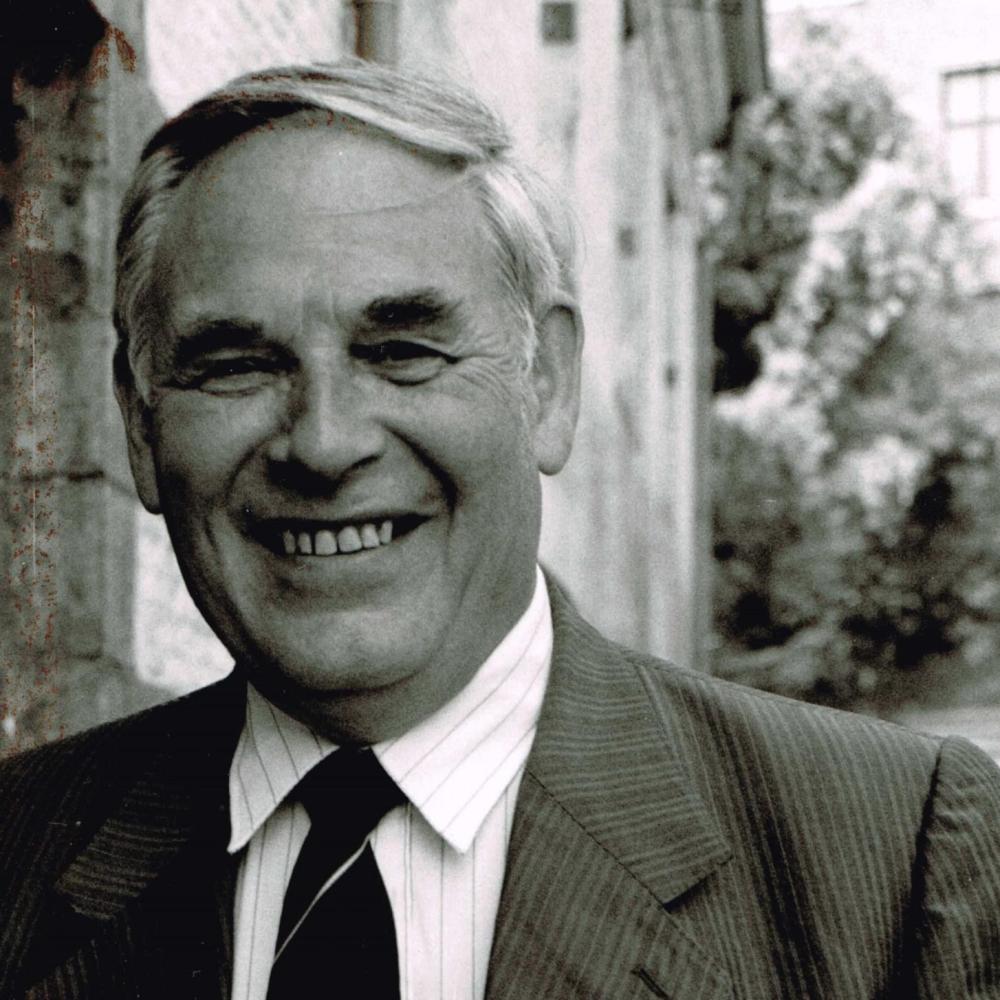
Bio/CV
Sylvain Loccufier was born in Bruges on 1 November 1934 After studying economic sciences in Ghent and Cologne, he began his career at the Vrije Universiteit Brussel, where he remained until his rectorship. He then focused on a career within the Humanist Alliance, an organisation that had been close to his heart throughout his life.
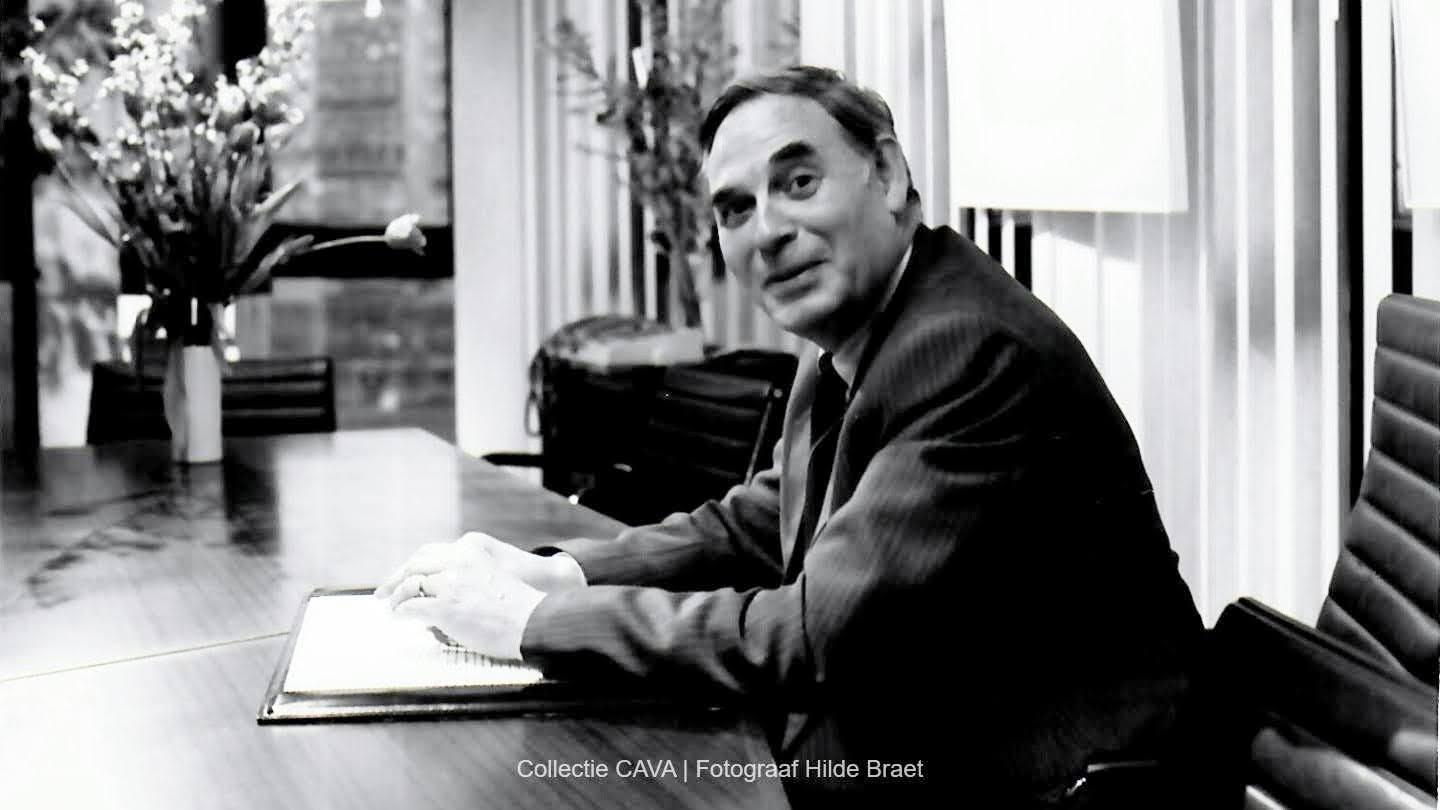
Sylvain Loccufier in 1998, Foto CAVA
This rector portrait is based in part on the historical treatises and resources of The Center for Academic and Liberal Archives. The scientific material can be found on their website.
Rectorship
Sylvain Loccufier was elected rector of the Vrije Universiteit Brussel in 1986. During his tenure, which coincided with the 15th anniversary of the university, he made an assessment of the various developments the university had gone through. He put great energy into social integration. The economic crisis was still in full force and subsidies were being cut, so Loccufier went in search of additional funds to develop new options for the university. At the time, universities were only able to add new graduate courses in existing third-cycle programmes. He sought to maximise teaching and encouraged professors to develop new initiatives. After all, new courses would lead to more students and thus more subsidies.
He also advocated the creation of a “cultural university”, an institution that would train thinking people to shape society. He believed that young people with fewer study opportunities should be given opportunities and be supported and was committed to expanding programmes for job seekers and students who worked in the evenings.
To give more opportunities to these groups, three self-study centres were set up between 1986 and 1989. Loccufier was also very involved in integrating people with disabilities. For example, he developed technology to produce courses in Braille. This later led to an inclusion policy. He also championed the interests of young athletes, leading to the creation of the Top Sport and Study programme in 1987.
The university’s research policy received an extra push in 1989 with the establishment of the university publishing house VUBPress, with Els Witte as its driving force. Loccufier was committed to improving computing equipment, including buying a supercomputer (CRAY) for optimal scientific computing power. He promoted initiatives to bring science closer to society, such as researcher days and the exhibition The Spiral of Knowing. These ideas led to the first science week in 1988, which later spread throughout Flanders.
Loccufier believed in the internationalisation of the VUB. He advocated maximum participation in Erasmus programmes and criticised the limited number of European students Flemish universities were allowed to enrol. Given Brussels’ international potential, in 1987 the VUB, in cooperation with Boston University, founded Vesalius College, an institution based on the American model. With the expansion of third-cycle courses, English-language programmes emerged at the VUB in addition to Dutch-language ones, such as the Master in Human Ecology in 1988. Loccufier worked on expanding international networks, partly thanks to programmes of the EEC and the General Administration for Development Cooperation, and concluded several agreements with foreign universities. His internationalisation policy was boosted by the creation of Unica in 1990, a network of universities based in capital cities, in which the VUB was fully involved.
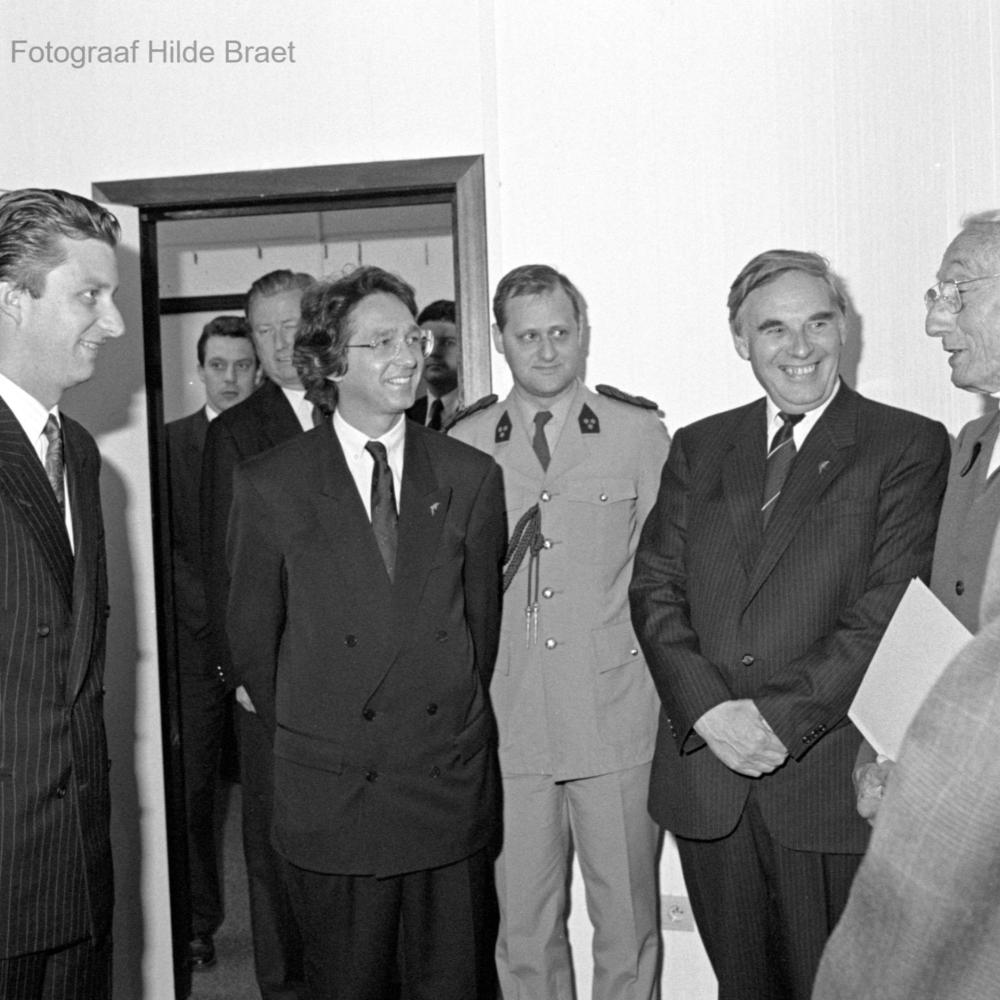
The Humanist Alliance
As president of the Humanist Alliance, Loccufier was committed to many diverse issues. He emphasised the importance of the Humanist Alliance in ethical and philosophical discussions and believed that the alliance should prioritise amending the constitution for the recognition of liberty.
Studies and career
Sylvain Loccufier was born on 1 November 1934 in Bruges. He attended the state secondary boys’ school and the Royal Atheneum in his hometown. From 1954 to 1959, he studied economics at Ghent University. During this period, he obtained three important diplomas: he became a licentiate in economic sciences and in commercial and financial sciences, and obtained the aggregate for higher secondary education. His graduation thesis, “The development of money supply in Belgium after World War II”, stood out.
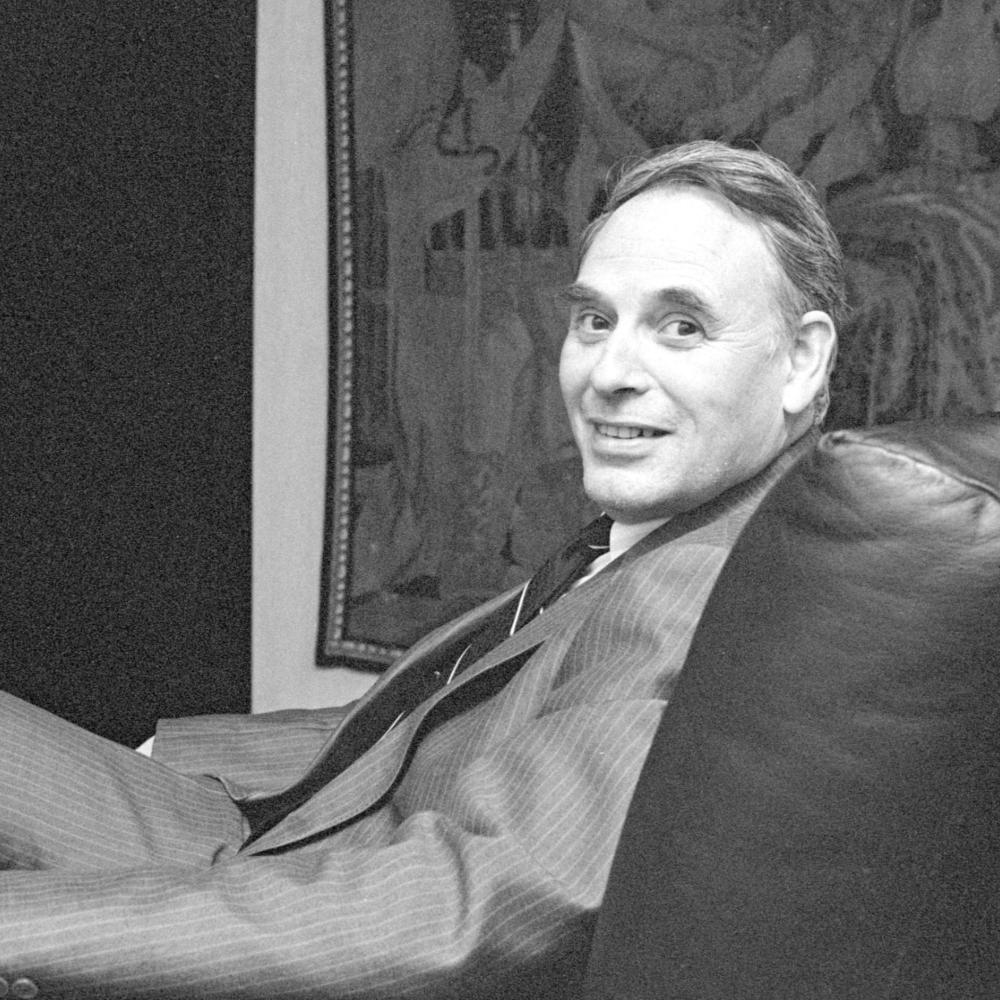
Broadening of his academic horizons
These achievements opened doors for Loccufier. As a promising researcher, he received a scholarship from the Ministry of National Education, which gave him the chance to broaden his academic horizons with a year of study in Cologne, Germany. There, he further specialised in banking science. His talent did not go unnoticed; the Alexander von Humbold Foundation funded another year for him in Germany. In July 1960, he completed his period in Cologne by obtaining his doctorate. His dissertation topic was “Die Belgische Währungsreform” (The Belgian Monetary Reform)
After his academic adventures in Germany, Loccufier returned to Belgium, where he did his military service, which at the time was still compulsory. He concluded his time in the army as First Lieutenant of the Reserve, a position that demonstrated his capacity for leadership. He then accepted an assistantship at the Seminary of Financial Economics in Ghent, a position he held until 1965. He was also a researcher in the Department of Applied Economics at the University of Cambridge and taught several short lectureships. These included roles at the National University Centre of Antwerp, at the Ministry of Foreign Affairs, and at the Dutch-language department of ULB. His work at ULB led to a part-time lectureship in 1967, and eventually, from 1 October 1969, to a full-time professorship at the VUB.
At the VUB, Loccufier started teaching the course Economic and Financial Aspects of Insurance in 1967. The following year, Economic Structures and Economic Systems was added to his teaching programme. From 1969, he taught a wide range of courses, including Theory of Finance, Public Finance, Industrial Accounting and Organisational and Financial Aspects of Social Security. His course portfolio was diverse and included subjects such as Current Financial Problems, Business Economics of Health Institutions and Health Economics, illustrating his broad knowledge and interest in financial topics.
Loccufier’s academic career at VUB was marked by numerous academic positions. His growing responsibilities and recognition led to his appointment as dean of the Faculty of Economic, Social and Political Sciences in 1985. A year later, he was elected rector. He would continue in this important role until 1990.
Honorary doctorate Vaclav Havel
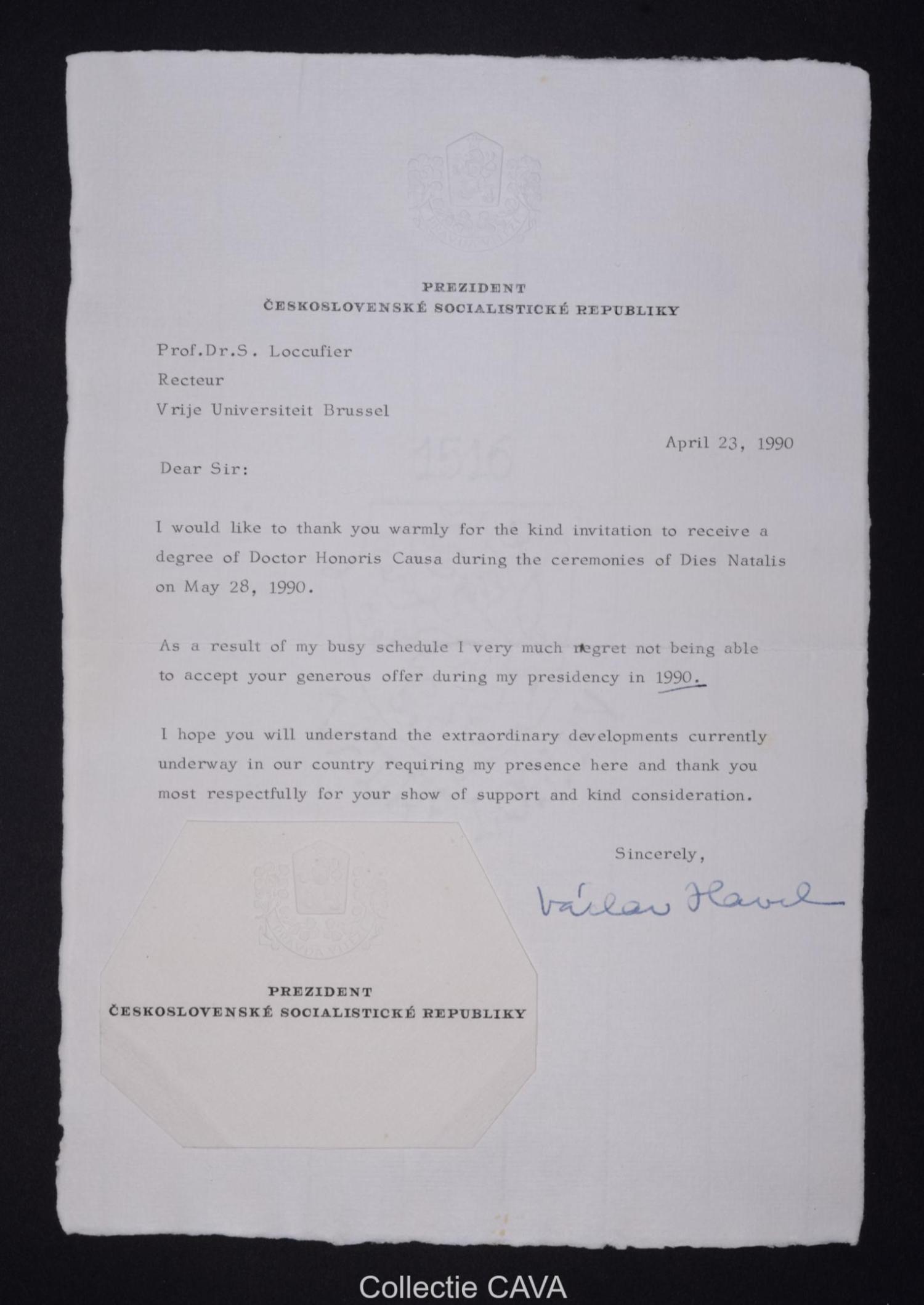
Letter from Vaclav Havel to Rector Loccufier apologising for not being able to accept the invitation to collect the honorary doctorate, 23/04/1990. CAVA archive
Prizes and titles
- Liberal Humanism Prize on 21 June 2017
- Brother at the Aalst lodge Ontwaken, part of the Grand Orient of Belgium
- Vice-president of the board of directors of Uitstraling Permanente Vorming
Bibliography
- Loccufier, Sylvain Julien. "Die Belgische Währungsreform." (No Title) (1960)
- Loccufier, Sylvain, and Ursula Engelen-Kefer. "The economic and social situation of the Community. 2 opinions." (1982).
- Loccufier, Sylvain. "Transport policy in the 1980s. Opinion, March 1983." (1983).
- Founding Vesalius College: cooperation between Boston University and VUB (1987)
- Marc GALLE & Sylvain LOCCUFIER (eds.) Facets of 100 years of political, economic and social history. Commemorating the birth of Achiel Van Acker, 1898-1998, Brussels: VUBPRESS, 2000,